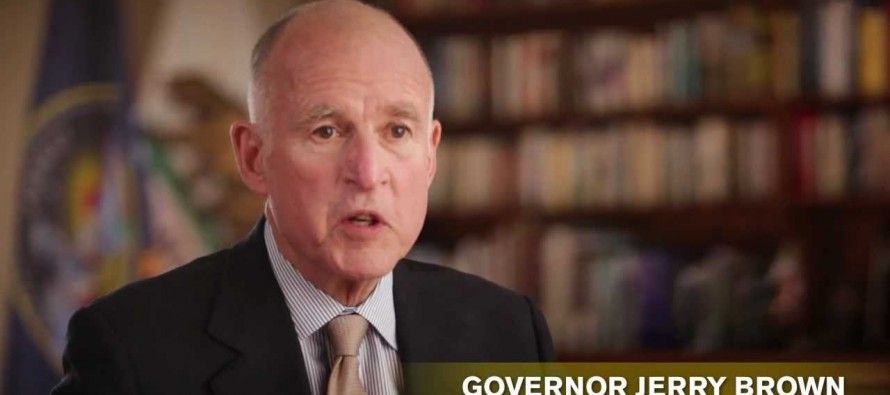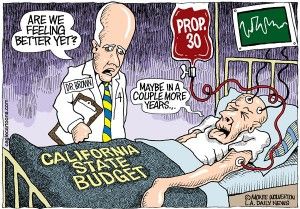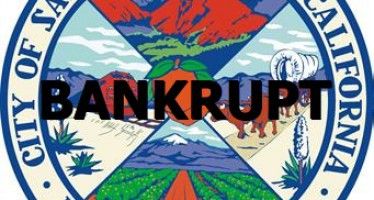As we predicted, pensions eating up Prop. 30 education funds

By John Seiler
As Bill Clinton might put it, it’s in the math.
In the lead up to the November 6 election last fall, CalWatchdog.com ran several articles on Proposition 30 and pensions. We warned that the $7 billion tax increase would go not to schools, as advertised by Gov. Jerry Brown and others in TV ads, but to teacher pensions and other spending. I’ll quote some below.
The news now is that this is exactly what is happening. David Crane, a Democrat who was a budget adviser to Republican Gov. Arnold Schwarzenegger, has the facts in a Bloomberg article:
“Most Californians would be surprised to learn that 100 percent of education’s share of the tax increase proposed by Governor Jerry Brown will go to pensions instead of classrooms. But that would be no surprise to longtime observers of the California State Teachers’ Retirement System, which administers teacher pensions.
“Here’s why: After retirement, teachers are unconditionally guaranteed lifetime pensions by their school districts. Everything works out fine if CalSTRS, as the retirement system is known, earns the investment returns it forecasts and from which upfront contributions are derived.
“But if they fall short, school districts must make up the difference. Because of compounding, the failure to earn forecasted earnings translates into huge deficiencies down the road.
“Unfortunately, ‘down the road’ is where school districts are now.”
He noted something Katy Grimes reported here in March on a Legislative Analyst Report, which found that the California State Teachers Retirement System needs $4.5 billion a year in new funding to keep afloat. Prop. 30 now is expected to bring in $7 billion in new revenues. Crane noted that, because of Proposition 98, about 40 percent of any new revenue must go to schools. He wrote, “[T]hat means almost $3 billion a year for the schools to use for pensions, or two-thirds of the CalSTRS $4.5 billion request. A good start to meeting pension costs, but none of the tax increase will benefit students.”
So the pensions will eat up all the $3 billion from Prop. 30 going to “schools” — plus another $1.5 billion from other general-fund dollars.
How did CalSTRS get in the mess? Crane explained:
“In short, it failed to take Warren Buffett’s advice. In 1999, Buffett said that long-term investors, such as pension funds, should assume investment returns of roughly 6 percent a year, not far from the actual return earned since then. Had CalSTRS used his figure for its projections of the fund’s growth, it would have required larger contributions from school districts, employees and the state, and CalSTRS would be healthier now.
“But the retirement fund’s board — made up of the state’s chief financial officials and others — chose to forecast much higher investment returns that, as Buffett later pointed out, implicitly predicted the stock market portion of the CalSTRS portfolio to perform 10 times better than stocks did in the 20th century.”
CalWatchdog.com predicted the Prop. 30 legerdemain
All of this was known to readers of CalWatchdog.com before the election because we reported on it.
I wrote on Sept. 12 in an article titled, “California Budget Project analysis of Prop. 30 slights slam to business, jobs”:
“Being pushed by Gov. Jerry Brown and the state’s powerful government-worker unions, Prop. 30 would increase sales and income taxes taxes by from $6 billion to $8.5 billion a year. Supposedly the money would preclude cuts in K-12 and college education. But there’s no guarantee the higher taxes wouldn’t go toward the state’s burgeoning pension costs for retired government workers. All government money is fungible.”
I also wrote on Oct. 27 in an article titled, “Yes, Prop. 30 would fund pensions”:
“If Proposition 30 passes, the $6 billion it would soak from taxpayers would just go straight to public-employee pensions….
“In sum, the $6 billion from Prop. 30 would go to pay $6.4 billion in state pension payments.
“Everything else is a deception.”
On Oct. 31, Steven Greenhut wrote in an article titled, “Pay soars in the public sector”:
“Californians are stuck watching those dreadful union-financed campaign TV ads supporting Proposition 30, which would push our highest income-tax rates to the stratosphere and boost sales taxes. The main rationale for high taxes, we’re told, is that California is slashing public school funding and laying off teachers….
“What will happen if California voters approve Prop. 30? Check out the many bills that moved through the Legislature this session, as legislators crafted new proposed programs and benefit increases for their public-employee constituents.”
On Nov. 2, Wayne Lusvardi wrote in an article titled, “Prop. 30 would make budget roller coaster more scary”:
“Declaring that K-12 public school budgets would have to be cut [unless Prop. 30 passed] is the way the state socially constructs and manages a budget crisis. It is never portrayed that it is the Medi-Cal or public pension funds that are running a deficit. Public school children are used as poster children every year for any revenue shortfalls in health and welfare programs, pensions, or bond debts….
“In the above table [in the Lusvardi article], it appears that the hole in the state budget is in the Bond Fund. This would include the liability for public pensions. Retirement benefit costs have increased from $1.4 billion in 1999 to $6.5 billion this fiscal year.”
For reference, here’s one of the misleading TV ads the Prop. 30 campaign ran:
Related Articles
State owes counties $22 million in taxes, refuses to pay
April 16, 2013 By Dave Roberts If you decide not to pay your taxes, you could face stiff penalties, seizure
Loan Bailout Rips Off Middle Class
FEB. 13, 2012 By WAYNE LUSVARDI In a modern version of one of Aesop’s classic fables, a whooping crane swoops
San Bernardino bankruptcy shows pensions crowding out services
In his novel “The Sun Also Rises,” California novelist Ernest Hemingway wrote, “How do you go bankrupt? Two ways: Gradually,




